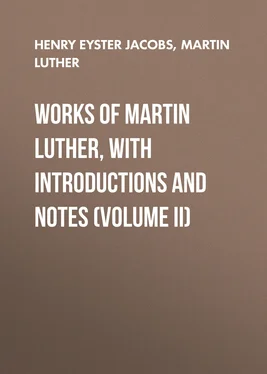Henry Eyster Jacobs - Works of Martin Luther, with Introductions and Notes (Volume II)
Здесь есть возможность читать онлайн «Henry Eyster Jacobs - Works of Martin Luther, with Introductions and Notes (Volume II)» — ознакомительный отрывок электронной книги совершенно бесплатно, а после прочтения отрывка купить полную версию. В некоторых случаях можно слушать аудио, скачать через торрент в формате fb2 и присутствует краткое содержание. Жанр: foreign_prose, foreign_religion, Философия, foreign_psychology, foreign_antique, на немецком языке. Описание произведения, (предисловие) а так же отзывы посетителей доступны на портале библиотеки ЛибКат.
- Название:Works of Martin Luther, with Introductions and Notes (Volume II)
- Автор:
- Жанр:
- Год:неизвестен
- ISBN:нет данных
- Рейтинг книги:3 / 5. Голосов: 1
-
Избранное:Добавить в избранное
- Отзывы:
-
Ваша оценка:
- 60
- 1
- 2
- 3
- 4
- 5
Works of Martin Luther, with Introductions and Notes (Volume II): краткое содержание, описание и аннотация
Предлагаем к чтению аннотацию, описание, краткое содержание или предисловие (зависит от того, что написал сам автор книги «Works of Martin Luther, with Introductions and Notes (Volume II)»). Если вы не нашли необходимую информацию о книге — напишите в комментариях, мы постараемся отыскать её.
Works of Martin Luther, with Introductions and Notes (Volume II) — читать онлайн ознакомительный отрывок
Ниже представлен текст книги, разбитый по страницам. Система сохранения места последней прочитанной страницы, позволяет с удобством читать онлайн бесплатно книгу «Works of Martin Luther, with Introductions and Notes (Volume II)», без необходимости каждый раз заново искать на чём Вы остановились. Поставьте закладку, и сможете в любой момент перейти на страницу, на которой закончили чтение.
Интервал:
Закладка:
Moreover, it can be no good spirit who has invented such exceptions and granted to sin such license and impunity. For if we are bound to strive against the works and words of the evil spirit, and to drive him out in whatever way we can, as Christ commands and His Apostles, ought we, then, to suffer it in silence when the pope or his satellites are bent on devilish words and works? Ought we for the sake of men to allow the suppression of divine commandments and truths which we have sworn in baptism to support with life and limb? Of a truth we should then have to answer for all the souls that would thereby be abandoned and led astray.
It must therefore have been the very prince of devils who said what is written in the canon law: "If the pope were so scandalously bad as to lead souls in crowds to the devil, yet he could not be deposed." 124 124 The statement of which Luther here complains is found in the Decretum of Gratian, Dist. XL, c. 6, Si papa . In his Epitome (see Introduction, p. 58), Prierias had quoted this canon against Luther, as follows: " A Pontifex indubitatus (i. e., a pope who is not accused of heresy or schism) cannot lawfully be deposed or judged either by a council or by the whole world, even if he is so scandalous as to lead people with him by crowds into the possession of hell." Luther's comment is: "Be astonished, O heaven; shudder, O earth! Behold, O Christians, what Rome is!" ( Weimar Ed. , VI, 336).
On this accursed and devilish foundation they build at Rome, and think that we should let all the world go to the devil, rather than resist their knavery. If the act that one man is set over others were sufficient reason why he should escape punishment, then no Christian could punish another, since Christ commands that every man shall esteem himself the lowliest and the least. [Matt. 18:4]
Where sin is, there is no escape from punishment; as St. Gregory 125 125 Gregory the Great, pope 590-604. The passage is found in Migne, LXXVI, 203; LXXVII, 34.
also writes that we are indeed all equal, but guilt puts us in subjection one to another. Now we see how they whom God and the Apostles have made subject to the temporal sword deal with Christendom, depriving it of its liberty by their own wickedness, without warrant of Scripture. It is to be feared that this is a game of Anti-christ 126 126 Antichrist, the incarnation of all that is hostile to Christ and His Kingdom. His appearance is prophesied in 2 Thess. 2:3-10 (the "man of sin, sitting in the temple of God"); 1 John 2:18, 22; 4:3, and Rev. 13. In the early Church the Fathers sometimes thought the prophecies fulfilled in the person of some especially pestilent heretic. Wyclif applied the term to the pope,—"the pope would seem to be not the vicar of Christ, but the vicar of Antichrist" (see Loos, Dogmengeschichte , 4th ed., p. 649). On Dec. 11, 1518, Luther wrote to Link: "You can see whether my suspicion is correct that at the Roman court the true Antichrist rules of whom St. Paul speaks"; and March 13, 1519, he wrote to Spalatin: "I am not sure but that the pope is Antichrist or his apostle." It was the worldly pretensions of the papacy which suggested the idea both to Wyclif and to Luther. By the year 1520 Luther had come to the definite conclusion that the pope was the "man of sin, sitting in the temple of God," and this opinion he never surrendered.
or a sign that he is close at hand.
[Sidenote: The Second Wall—The Pope the Interpreter of Scripture; Papal Infallibility]
The second wall is still more flimsy and worthless. They wish to be the only Masters of the Holy Scriptures 127 127 According to academic usage, the holder of a Master's degree was authorised to expound the subject named in the degree.
even though in all their lives they learn nothing from them. They assume for themselves sole authority, and with insolent juggling of words they would persuade us that the pope, whether he be a bad man or a good man, cannot err in matters of faith 128 128 The doctrine of papal infallibility was never officially sanctioned in the Middle Ages, but the claim of infallibility was repeatedly made by the champions of the more extreme view of papal power, e. g., Augustinus Triumphus (died 1328) in his Summa de potestate Papae . In his attack upon the XCV Theses ( Dialogus de potestate Papae , Dec, 1517) Prierias had asserted, "The supreme pontiff (i. e., the pope) cannot err when giving a decision as pontiff, i. e., speaking officially ( ex officio ), and doing what in him lies to learn the truth"; and again, "Whoever does not rest upon the teaching of the Roman Church and the supreme pontiff as an infallible rule of faith, from which even Holy Scripture draws its vigor and authority, is a heretic" ( Erl. Ed., op. var. arg. , I, 348). In the Epitome he had said: "Even though the pope as an individual ( singularis persona ) can do wrong and hold a wrong faith, nevertheless as pope he cannot give a wrong decision" ( Weimar Ed. , VI, 337).
; and yet they cannot prove a single letter of it. Hence it comes that so many heretical and unchristian, nay, even unnatural ordinances have a place in the canon law, of which, however, there is no present need to speak. For since they think that the Holy Spirit never leaves them, be they never so unlearned and wicked, they make bold to decree whatever they will. And if it were true, where would be the need or use of the Holy Scriptures? Let us burn them, and be satisfied with the unlearned lords at Rome, who are possessed of the Holy Spirit,—although He can possess only pious hearts! Unless I had read it myself 129 129 Most recently in Prierias's Epitome . See preceding note.
, I could not have believed that the devil would make such clumsy pretensions at Rome, and find a following.
But not to fight them with mere words, we will quote the Scriptures. St. Paul says in I Corinthians xiv: anyone something better is revealed, though he be sitting and listening to another in God's Word, then the first, who is speaking, shall hold his peace and give place." [1 Cor. 14:30] What would be the use of this commandment, if we were only to believe him who does the talking or who has the highest seat? [John 6:45] Christ also says in John vi, that all Christians shall be taught of God. Thus it may well happen that the pope and his followers are wicked men, and no true Christians, not taught of God, not having true understanding. On the other hand, an ordinary man may have true understanding; why then should we not follow him? Has not the pope erred many times? Who would help Christendom when the pope errs, if we were not to believe another, who had the Scriptures on his side, more than the pope?
Therefore it is a wickedly invented fable, and they cannot produce a letter in defence of it, that the interpretation of Scripture or the confirmation of its interpretation belongs to the pope alone. They have themselves usurped this power; and although they allege that this power was given to Peter when the keys were given to him, it is plain enough that the keys were not given to Peter alone, but to the whole community 130 130 Luther had discussed the whole subject of the power of the keys in a Latin treatise, Resolutio super propositione xiii. de potestate papae , of 1519 ( Weimar Ed. , II, pp. 185 ff.), and in the German treatise The Papacy at Rome (Vol. I, pp. 337-394).
. Moreover, the keys were not ordained for doctrine or government, but only for the binding and loosing of sin [John 20:22 ff.], and whatever further power of the keys they arrogate to themselves is mere invention. But Christ's word to Peter, "I have prayed for thee that thy faith fail not," [Luke 22:32] cannot be applied to the pope, since the majority of the popes have been without faith, as they must themselves confess. Besides, it is not only for Peter that Christ prayed, but also or all Apostles and Christians, as he says in John xvii: "Father, I pray for those whom Thou hast given Me, and not for these only, but for all who believe on Me through their word." [John 17:9, 20] Is not this clear enough?
Интервал:
Закладка:
Похожие книги на «Works of Martin Luther, with Introductions and Notes (Volume II)»
Представляем Вашему вниманию похожие книги на «Works of Martin Luther, with Introductions and Notes (Volume II)» списком для выбора. Мы отобрали схожую по названию и смыслу литературу в надежде предоставить читателям больше вариантов отыскать новые, интересные, ещё непрочитанные произведения.
Обсуждение, отзывы о книге «Works of Martin Luther, with Introductions and Notes (Volume II)» и просто собственные мнения читателей. Оставьте ваши комментарии, напишите, что Вы думаете о произведении, его смысле или главных героях. Укажите что конкретно понравилось, а что нет, и почему Вы так считаете.












